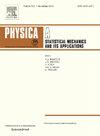基于细粒度多特征属性的可解释知识跟踪
IF 3.1
3区 物理与天体物理
Q2 PHYSICS, MULTIDISCIPLINARY
Physica A: Statistical Mechanics and its Applications
Pub Date : 2025-10-22
DOI:10.1016/j.physa.2025.131068
引用次数: 0
摘要
随着海量教育数据的增长和人工智能技术的飞速发展,知识追踪对于评估学生的知识状态变得越来越重要。现有的基于深度学习的知识跟踪模型已经取得了越来越高的预测精度。然而,它们未能捕捉到具有明确教育意义的重要特征,这限制了教育者对诊断结果的理解、信任和实际使用。本文提出了一种细粒度多特征属性可解释知识跟踪模型(MFA-IKT)。它将教育理论与学生的学习行为模式相结合,在难度和辨别性方面建模问题的细粒度特征,捕捉学生在知识掌握和能力概况方面的多维动态特征。采用树增强朴素贝叶斯结构构建证据特征与预测结果之间的依赖关系。在五个真实数据集上的实验表明,我们的模型优于所有基线,包括基于深度学习的模型,AUC平均提高9.28%,RMSE平均提高9.99%。进一步分析发现,问题侧特征比学生侧特征的影响更大。在细粒度问题特征中,判别特征显著提高了模型的预测性能。本研究通过建模可解释特征和归因预测结果,提出了“学习结果预测→特征归因→教学干预建议”的个性化教育可解释智能辅导框架。本文章由计算机程序翻译,如有差异,请以英文原文为准。
Interpretable knowledge tracing via fine-grained multi-feature attribution
With the growth of massive educational data and the rapid advancement of artificial intelligence technologies, knowledge tracing has become increasingly important for assessing students’ knowledge states. Existing deep learning-based knowledge tracing models have achieved increasingly high predictive accuracy. However, they fail to capture significant features with explicit educational significance, which limits educators’ understanding, trust, and practical use of the diagnostic results. In this paper, we propose a Fine-Grained Multi-Feature Attribution Interpretable Knowledge Tracing model (MFA-IKT for short). It integrates educational theories with students’ learning behavior pattern, modeling fine-grained features of questions in terms of difficulty and discrimination and capturing the multidimensional dynamic features of students on knowledge mastery and ability profile. A Tree-Augmented Naive Bayes structure is adopted to construct the dependencies between the evidence features and the prediction outcomes. Experiments on five real-world datasets show that our model outperforms all baselines, including deep learning-based models, achieving average improvements of 9.28% in AUC and 9.99% in RMSE. Further analysis reveals that question-side features have a greater impact than student-side features. Among the fine-grained question features, discriminative features significantly enhance the model’s predictive performance. This study, through modeling interpretable features and attributing prediction outcomes, presents an explainable intelligent tutoring framework for personalized education, comprising “learning outcome prediction feature attribution instructional intervention suggestions”.
求助全文
通过发布文献求助,成功后即可免费获取论文全文。
去求助
来源期刊
CiteScore
7.20
自引率
9.10%
发文量
852
审稿时长
6.6 months
期刊介绍:
Physica A: Statistical Mechanics and its Applications
Recognized by the European Physical Society
Physica A publishes research in the field of statistical mechanics and its applications.
Statistical mechanics sets out to explain the behaviour of macroscopic systems by studying the statistical properties of their microscopic constituents.
Applications of the techniques of statistical mechanics are widespread, and include: applications to physical systems such as solids, liquids and gases; applications to chemical and biological systems (colloids, interfaces, complex fluids, polymers and biopolymers, cell physics); and other interdisciplinary applications to for instance biological, economical and sociological systems.

 求助内容:
求助内容: 应助结果提醒方式:
应助结果提醒方式:


